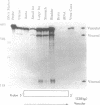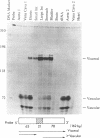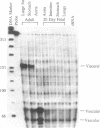Abstract
Previous work demonstrated that the rabbit smooth muscle myosin heavy chain gene showed sequence divergence at the 25kDa/50kDa junction of the S1 subfragment when compared to chicken gizzard and chicken epithelial nonmuscle myosin. RNase protection analysis with a probe spanning this region detected two partially protected fragments which were not present in RNA from vascular tissue and only found in RNA from visceral tissue. The polymerase chain reaction was used to amplify a 162bp product from primers spanning the putative region of divergence and DNA sequence analysis revealed a seven amino acid insertion not previously detected in other characterised cDNA clones. RNase protection analysis using the PCR product as probe showed that the inserted sequence was expressed exclusively in RNA from visceral tissue. Similar RNA analysis showed that the visceral isoform was not expressed in 20 day fetal rabbit smooth muscle tissues. These results indicated that the new visceral isoform was expressed in a tissue-specific and developmentally regulated manner. Genomic DNA sequencing and mapping of the exon-intron boundaries showed that the visceral isoform was the product of cassette-type alternative splicing. The inclusion of a visceral-specific sequence near the Mg-ATPase domain and at the 25kDa/50kDa junction suggests that the visceral isoform may be important for myosin function in smooth muscle cells.
Full text
PDF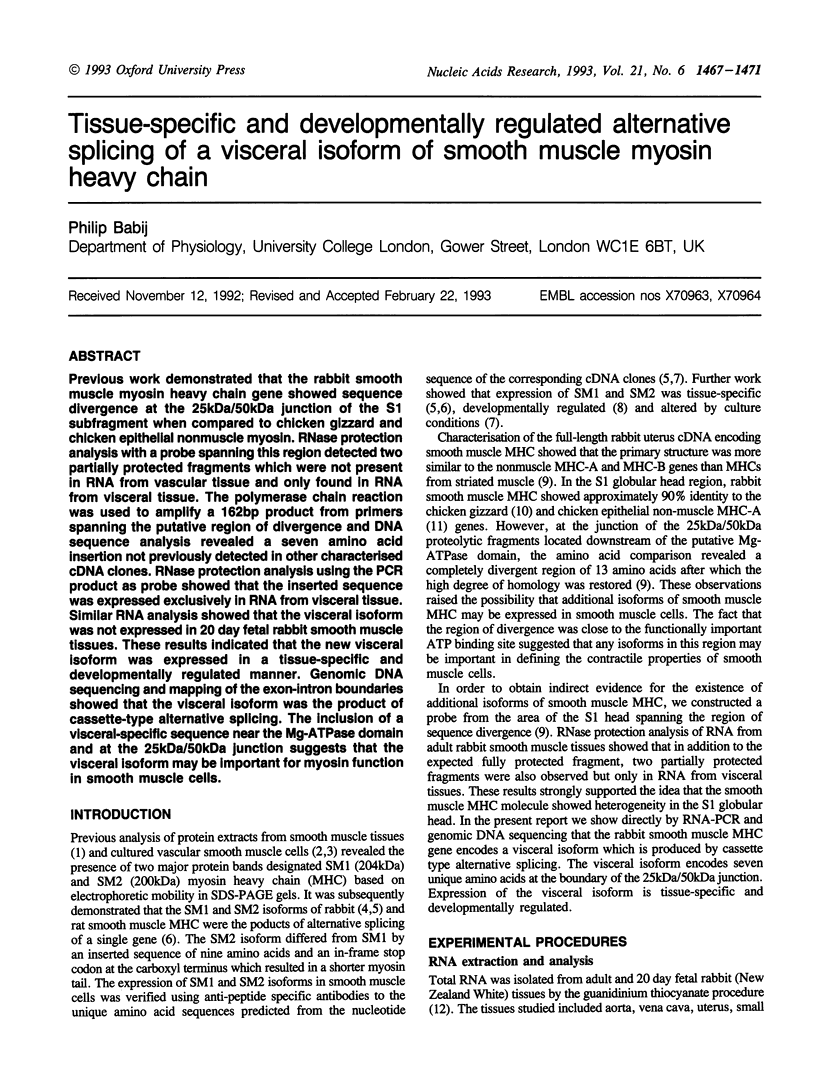
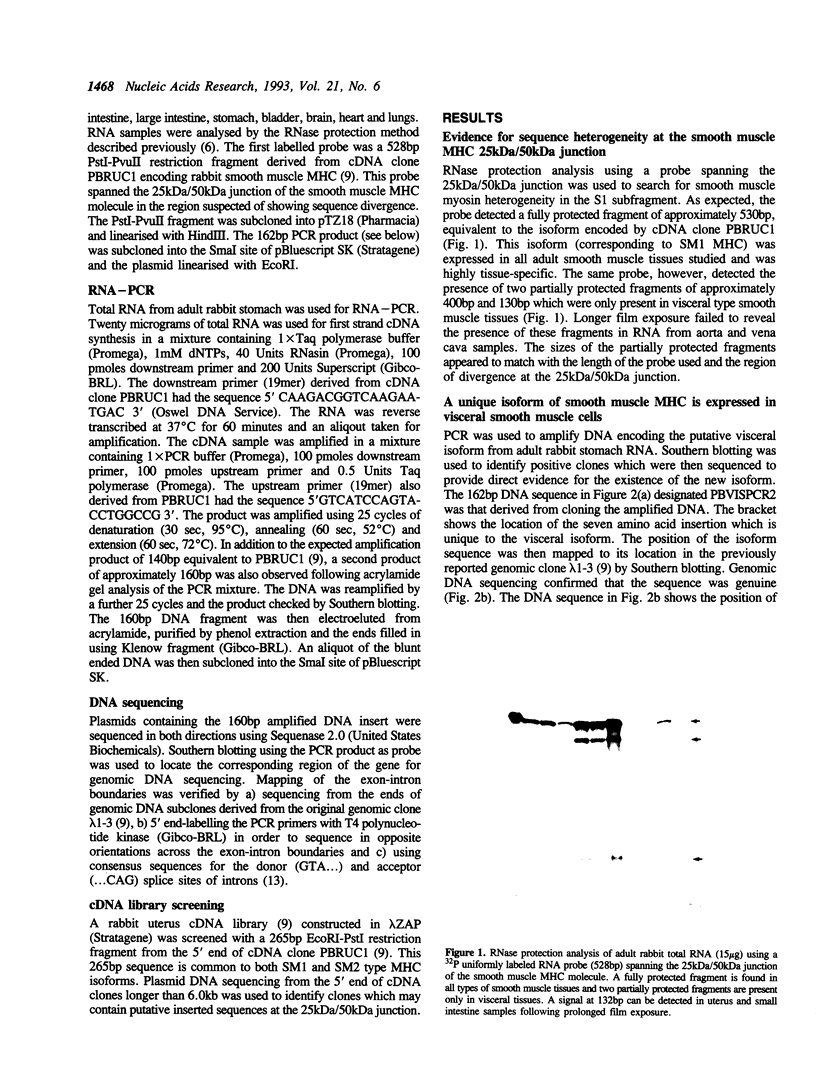
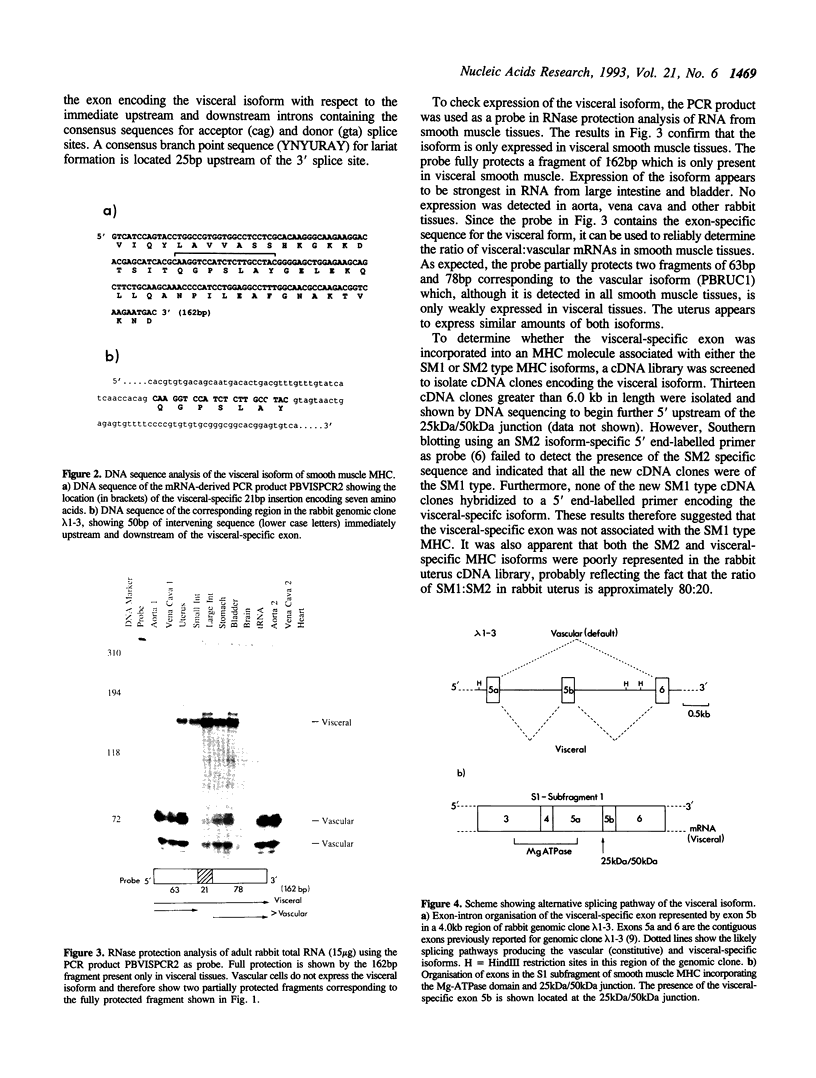
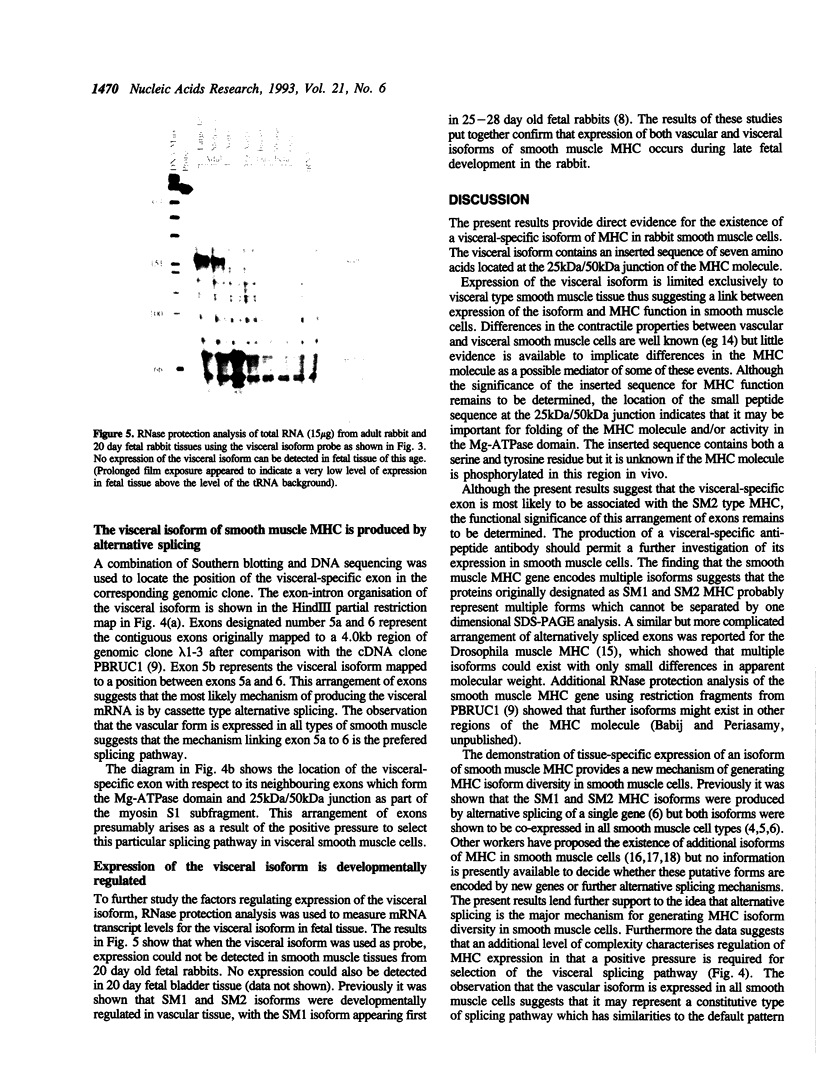
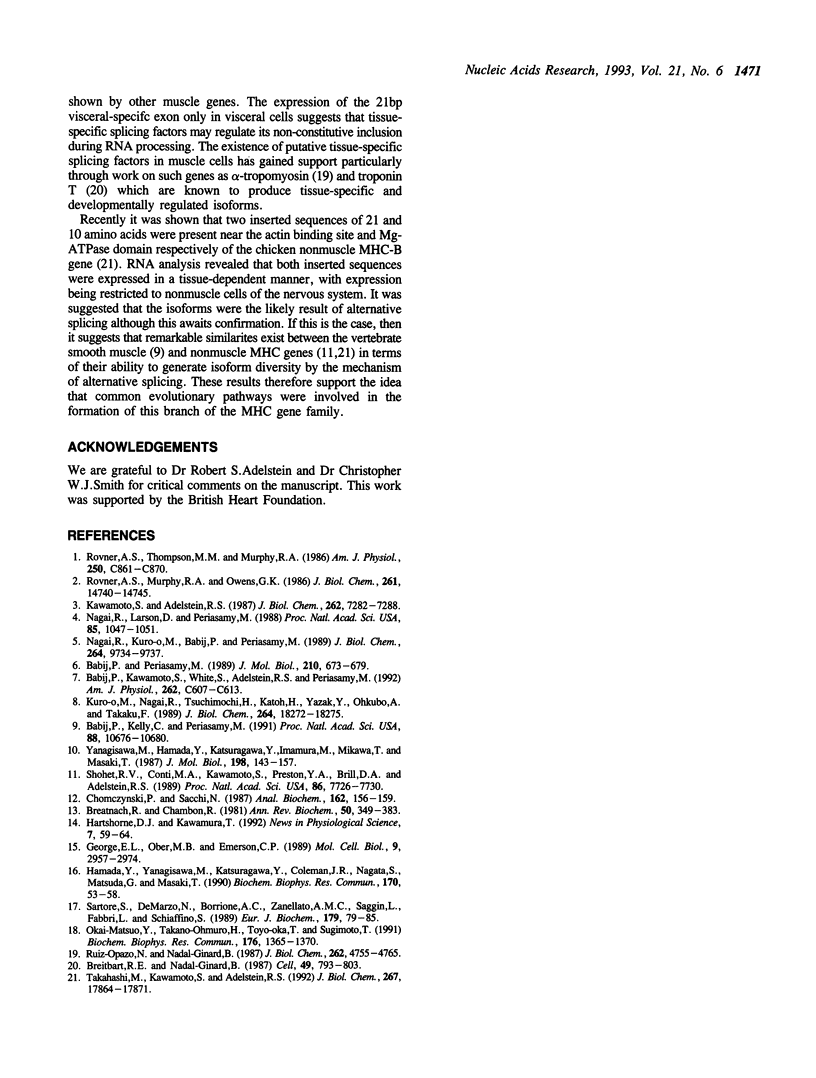
Images in this article
Selected References
These references are in PubMed. This may not be the complete list of references from this article.
- Babij P., Kawamoto S., White S., Adelstein R. S., Periasamy M. Differential expression of SM1 and SM2 myosin isoforms in cultured vascular smooth muscle. Am J Physiol. 1992 Mar;262(3 Pt 1):C607–C613. doi: 10.1152/ajpcell.1992.262.3.C607. [DOI] [PubMed] [Google Scholar]
- Babij P., Kelly C., Periasamy M. Characterization of a mammalian smooth muscle myosin heavy-chain gene: complete nucleotide and protein coding sequence and analysis of the 5' end of the gene. Proc Natl Acad Sci U S A. 1991 Dec 1;88(23):10676–10680. doi: 10.1073/pnas.88.23.10676. [DOI] [PMC free article] [PubMed] [Google Scholar]
- Babij P., Periasamy M. Myosin heavy chain isoform diversity in smooth muscle is produced by differential RNA processing. J Mol Biol. 1989 Dec 5;210(3):673–679. doi: 10.1016/0022-2836(89)90142-3. [DOI] [PubMed] [Google Scholar]
- Breathnach R., Chambon P. Organization and expression of eucaryotic split genes coding for proteins. Annu Rev Biochem. 1981;50:349–383. doi: 10.1146/annurev.bi.50.070181.002025. [DOI] [PubMed] [Google Scholar]
- Breitbart R. E., Nadal-Ginard B. Developmentally induced, muscle-specific trans factors control the differential splicing of alternative and constitutive troponin T exons. Cell. 1987 Jun 19;49(6):793–803. doi: 10.1016/0092-8674(87)90617-9. [DOI] [PubMed] [Google Scholar]
- Chomczynski P., Sacchi N. Single-step method of RNA isolation by acid guanidinium thiocyanate-phenol-chloroform extraction. Anal Biochem. 1987 Apr;162(1):156–159. doi: 10.1006/abio.1987.9999. [DOI] [PubMed] [Google Scholar]
- George E. L., Ober M. B., Emerson C. P., Jr Functional domains of the Drosophila melanogaster muscle myosin heavy-chain gene are encoded by alternatively spliced exons. Mol Cell Biol. 1989 Jul;9(7):2957–2974. doi: 10.1128/mcb.9.7.2957. [DOI] [PMC free article] [PubMed] [Google Scholar]
- Hamada Y., Yanagisawa M., Katsuragawa Y., Coleman J. R., Nagata S., Matsuda G., Masaki T. Distinct vascular and intestinal smooth muscle myosin heavy chain mRNAs are encoded by a single-copy gene in the chicken. Biochem Biophys Res Commun. 1990 Jul 16;170(1):53–58. doi: 10.1016/0006-291x(90)91239-o. [DOI] [PubMed] [Google Scholar]
- Kawamoto S., Adelstein R. S. Characterization of myosin heavy chains in cultured aorta smooth muscle cells. A comparative study. J Biol Chem. 1987 May 25;262(15):7282–7288. [PubMed] [Google Scholar]
- Kuro-o M., Nagai R., Tsuchimochi H., Katoh H., Yazaki Y., Ohkubo A., Takaku F. Developmentally regulated expression of vascular smooth muscle myosin heavy chain isoforms. J Biol Chem. 1989 Nov 5;264(31):18272–18275. [PubMed] [Google Scholar]
- Nagai R., Kuro-o M., Babij P., Periasamy M. Identification of two types of smooth muscle myosin heavy chain isoforms by cDNA cloning and immunoblot analysis. J Biol Chem. 1989 Jun 15;264(17):9734–9737. [PubMed] [Google Scholar]
- Nagai R., Larson D. M., Periasamy M. Characterization of a mammalian smooth muscle myosin heavy chain cDNA clone and its expression in various smooth muscle types. Proc Natl Acad Sci U S A. 1988 Feb;85(4):1047–1051. doi: 10.1073/pnas.85.4.1047. [DOI] [PMC free article] [PubMed] [Google Scholar]
- Okai-Matsuo Y., Takano-Ohmuro H., Toyo-oka T., Sugimoto T. A novel myosin heavy chain isoform in vascular smooth muscle. Biochem Biophys Res Commun. 1991 May 15;176(3):1365–1370. doi: 10.1016/0006-291x(91)90437-c. [DOI] [PubMed] [Google Scholar]
- Rovner A. S., Murphy R. A., Owens G. K. Expression of smooth muscle and nonmuscle myosin heavy chains in cultured vascular smooth muscle cells. J Biol Chem. 1986 Nov 5;261(31):14740–14745. [PubMed] [Google Scholar]
- Rovner A. S., Thompson M. M., Murphy R. A. Two different heavy chains are found in smooth muscle myosin. Am J Physiol. 1986 Jun;250(6 Pt 1):C861–C870. doi: 10.1152/ajpcell.1986.250.6.C861. [DOI] [PubMed] [Google Scholar]
- Ruiz-Opazo N., Nadal-Ginard B. Alpha-tropomyosin gene organization. Alternative splicing of duplicated isotype-specific exons accounts for the production of smooth and striated muscle isoforms. J Biol Chem. 1987 Apr 5;262(10):4755–4765. [PubMed] [Google Scholar]
- Sartore S., De Marzo N., Borrione A. C., Zanellato A. M., Saggin L., Fabbri L., Schiaffino S. Myosin heavy-chain isoforms in human smooth muscle. Eur J Biochem. 1989 Jan 15;179(1):79–85. doi: 10.1111/j.1432-1033.1989.tb14523.x. [DOI] [PubMed] [Google Scholar]
- Shohet R. V., Conti M. A., Kawamoto S., Preston Y. A., Brill D. A., Adelstein R. S. Cloning of the cDNA encoding the myosin heavy chain of a vertebrate cellular myosin. Proc Natl Acad Sci U S A. 1989 Oct;86(20):7726–7730. doi: 10.1073/pnas.86.20.7726. [DOI] [PMC free article] [PubMed] [Google Scholar]
- Takahashi M., Kawamoto S., Adelstein R. S. Evidence for inserted sequences in the head region of nonmuscle myosin specific to the nervous system. Cloning of the cDNA encoding the myosin heavy chain-B isoform of vertebrate nonmuscle myosin. J Biol Chem. 1992 Sep 5;267(25):17864–17871. [PubMed] [Google Scholar]
- Yanagisawa M., Hamada Y., Katsuragawa Y., Imamura M., Mikawa T., Masaki T. Complete primary structure of vertebrate smooth muscle myosin heavy chain deduced from its complementary DNA sequence. Implications on topography and function of myosin. J Mol Biol. 1987 Nov 20;198(2):143–157. doi: 10.1016/0022-2836(87)90302-0. [DOI] [PubMed] [Google Scholar]



